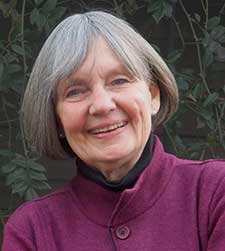Remembering Pauline by Joanne Freeman

Photograph courtesy of Andrea Maier.
Pauline Maier served on the Council of the Omohundro Institute from 1981 to 1984.
- Remembering Pauline Maier by Rick Beeman
- Remembering Pauline Maier by Richard Bernstein
- Remembering Pauline by Joanne Freeman
- Remembering Pauline Maier by Christopher Jedry
- Remembering Pauline Maier by Gary Kornblith
- Remembering Pauline Maier by Rob Martello
- Remembering Pauline Maier by Mary Beth Norton
- Remembering Pauline Maier by Ray Raphael
- Remembering Pauline Maier by Gordon Wood
Remembering Pauline
Pauline was a remarkable person—and a remarkable scholar—who did something that not all academics manage. She was a serious, invested, gifted, imaginative scholar with an infectious sense of fun. Her love of the process of research—rummaging through documents; making discoveries; putting together the pieces, stumbling across poignant human moments—was apparent whenever she spoke about her work, one of many reasons that she was so effective a “talking head” on history documentaries. A year or two ago, I heard her give a lecture on her ratification book, and was struck by how emotionally engaged she was with her work, and how willing she was to admit this to an academic audience. At one point, she discussed how profoundly moved she had been when reading an account of one state’s moment of ratification that described the tolling of bells as the convention voted in favor of the Constitution. I don’t think I’ve ever heard a scholar express her emotional engagement with her work so openly and eloquently. Equally striking was her paean to the compilers of the Documentary History of the Ratification of the Constitution at the University of Wisconsin. Pauline declared it her privilege to be writing her book as these volumes were coming to press. She was one of the first—if not the first—scholar to write a major history of ratification with over twenty of these volumes completed and at her disposal, and during her lecture she declared it an honor for which she was supremely grateful.
That same sort of humanity shaped her work. The chapter of American Scripture on the “other” declarations of independence is a striking example of this sensibility. I always use that chapter when teaching about the Declaration of Independence, because it reveals communities of people really wrestling over the idea of independence in town meetings and assemblies throughout the colonies. It does just what Pauline wanted it to do; it demystifies a Great Document, bringing it down to ground level and revealing the very human political wrangling and personal decisions that produced it.
The directness, the humor, the emotional engagement, the knowledge of human nature: all of these things were supremely Pauline. So was her willingness to invest her time and energies in junior scholars. Since her death, I’ve heard several stories from people whom she took under her wing to advance their careers; I’m lucky enough to count myself among them. She was remarkably generous in this way, quietly doing her best to encourage young scholars. Her advice was always straightforward, often blunt, but also caring and strikingly on target—the kind of advice that every scholar needs, but doesn’t always get. And she was very open to being challenged…as long as you had the stuff to back up your claims.
Although Pauline didn’t present herself as a “female” scholar—the material, the scholarship, the intellectual foundations always came first—as a female graduate student, I valued her example more than I can say. She was strong, direct, aggressive—and clearly having fun, reveling in the joy of scholarly discovery, and encouraging others to do the same. I’m supremely grateful to have met her at an early point in my career, when getting this kind of “permission” from a senior female scholar meant a lot. Her voice has been in my head ever after.
I’ll close with something that she wrote to me a year or two ago when I asked her how she felt about birthdays. (We share one). She said: “I guess I don’t pay all that much attention to birthdays. My philosophy is that if I do what I love doing in my life there’s no reason to regret the passage of time.” Pauline lived a life that was true to those words.
Joanne B. Freeman
Yale University
